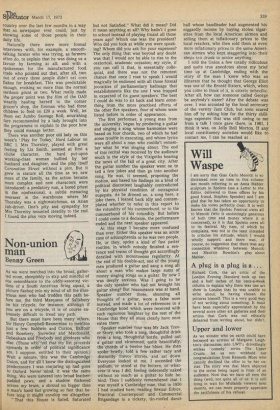Non-union man
Benny Green
As we were marched into the broad, galleried room, sheepishly in step and mindful of our resemblance to the oddly-assorted victims of a South American firing squad, a Picture flashed into my mind of all the illustrious men who had trodden this path before me, the third Marquess of Salisbury on his tricycle, for instance, although if You are on a tricycle, it is of course extremely difficult to tread any path.
But there must have been many others, Sir Henry Campbell-Bannerman to mention Just a few. Baldwin and Curzon, Balfour and Rosebery, Snowden and Macdonald, Debenham and Fi4eebody and goodness who else. (Those whO'feel that my list proceeds Upwards in order of political significance are, I suppose, entitled to their opinion.) Wait a minute, this was the Cambridge Union, and for all I knew the distinguished predecessors I was conjuring up had gone to Oxford. Never mind, it was the same thing. We were ushered into broad leatherpadded pews, and a shadow flickered across my brain, a shroud no bigger than a man's hand but growing so fast that before long it might envelop me altogether.
"That this House is Sated, Saturated but not Satisfied." What did it mean? Did it mean anything at all? Why hadn't I gone to school instead of playing truant all those years ago? Which one was the president? Who did you look at while you were speaking? Whom did you ask for your expenses? The only thing that was beyond any doubt was that I would not be able to rise to the oratorical, academic occasion; my style, if you can call it that, is essentially colloquial, and there was not the remotest chance that once I rose to speak I would magically be endowed with all those formal jocosities of parliamentary badinage that establishments like the one I was trapped in expected of its guest speakers: The best I could do was to sit back and learn something from the more practised efforts of the other five speakers, four of whom were listed before in order of appearance.
The first performer, a young man from the university, began by producing a guitar and singing a song whose harmonies were based on four chords, two of which he had some trouble in executing, and whose lyrics were all about a man who couldn't remember what he was singing about. The end of this recital was received by the audience much in the style of the Vizigoths hearing the 'news of the fall of a great city. After the guitar number the speaker went on to tell a few jokes and then go into another song. He was, it seemed, proposing the motion, and based his findings on a kind of political discontent laughably contradicted by his physical condition of outrageous eupepsia. As he droned on, a song here, a joke there, I leaned back idly and contemplated whether to refer in this report to the rotundity of his cummerbund. or to the cummerbund of his rotundity. But before I could come to a decision, the performance ended and the next speaker appeared.
At this stage I became more confused than ever. Either this speaker was an acute case of schizophrenia or he was two people. He, or they, spoke a kind of fast patter routine, in which nobody finished a sen tence and trains of thought got accordingly derailed with monotonous regularity. At the end of his double-act, one of the young men produced a guitar and sang a song all about a man who makes large sums of money singing songs on a guitar. By now I was deeply anxious. Was I going to be the only speaker who had not brought his guitar along? But reassurance was at hand. Speaker number three, shunning all thoughts of a guitar, wore a false nose instead, and made a lot of references to a Cambridge hotel which were received with such rapturous laughter by the rest of the House that they all must clearly have once eaten there.
Speaker number four was Mr Jack Trevor Story, who took a long, thoughtful drink froth a long, thoughtful bottle, pulled out a guitar and strummed, quite beautifully, the chords of a twelve bar blues. He then spoke briefly, told a few rather racy and distinctly Trevor stories, and sat down. Everyone looked at me. I ascended the podium, or stood at the lectern, or what ever it was I did, feeling indecently naked without so much as a guitar to hide be hind. Then I suddenly remembered that I was myself a Cambridge man, that in 1950 I had studied here, reading Sexual Ethics, Practical Counterpoint and Commercial Brigandage in a rickety, tin-roofed dance hall whose bandleader had augmented his niggardly income by buying stolen cigarettes from the local American airmen and selling them at inflationary prices to the local retailers, who then sold them at even more inflationary prices to the same American airmen who kept staggering into their shops tco drunk to notice anything.
I told the Union a few totally ridiculous and quite true anecdotes about my brief time up at Cambridge, ending with the story of the man I knew who was so illiterate that he thought that George Eliot was one of the Bronte Sisters, which, when you come to think of it, is utterly imbecilic. After all, how can someone called George be anybody's sister? After the debate was over, I was accosted by the local secretary of the varsity Jazz Club, but soon scared him off by asking him for the thirty shillings expenses that was still owing to me from a talk I once gave there, in 1961, I think it was, on Jelly Roll Morton. If any local constituency societies would like to contact me, I can be reached at . . .


































 Previous page
Previous page